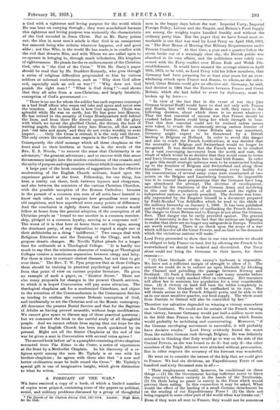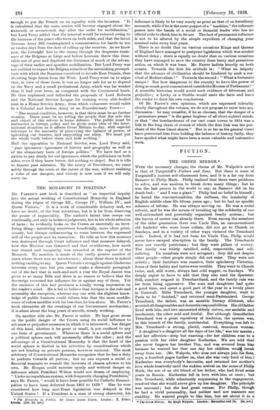A FORECAST OF THE WAR.*
WE have received a copy of a book, of which a limited number of copies were printed, containing some of the papers on political, social, and military problems discussed by a group- of thoughtful • The Records of the Chatham Dining Club, 191P-1914. London: Hugh Rees, for the Club.
men in the happy days before the war. Imperial Unity, Imperial Foreign Policy, Labour and the Empire, and Britain's Food Supply are among the weighty topics handled frankly and without the ordinary party bias. But the paper that we have found most re- markable is one that was read by Lord Percy on April 10th, 1913, on " The Best Means of Meeting Our Military Requirements under Present Conditions." At that time, a year and a quarter before the storm broke out of a seemingly clear sky, the British public was absorbed in its own affairs, and the politicians were solely con- cerned with the Party conflict over Home Rule and Welsh Dis- establishment. It would have amazed the average citizen on April 10th, 1913, to be told, as Lord Percy told his fellow-members, that Germany had been preparing for at least nine years for an over- whelming attack upon France and Russia, to whom, as she calcu- lated, Great Britain could give no effective aid. Germany, he said, had decided in 1904 that the Entente between France and Great Britain, which she had failed to avert by diplomacy, must be broken up by force :—
" In view of the fact that in the event of war they [the German General Staff] would have to deal not only with France and Russia, but with Great Britain as well, they came to the following decision, about which there is no secret whatever : That the first essential of success was that France should be crushed before Russia could bring her whole strength to bear. That this first essential could not be realised unless means were taken to evade the enormously strong eastern frontier of France. Further, that as Great Britain also was concerned, Germany might expect to be threatened by a British landing in Belgium or Holland. In order to avoid this danger and also to evade the French fortifications, it was decided that the neutrality of Belgium and Switzerland would no longer be recognised. It was decided that the French were to be crushed by a vast converging movement from the north and east, the result of which would be so decisive that they would come to terms and leave Germany and Austria free to deal with Russia. In order to gain this result strategic railways were to be constructed leading up to the frontiers of Belgium and Switzerland and along those frontiers. Two enormous camps containing every facility for the concentration of several army corps were constructed at two points on the Belgian and Luxemburg frontiers. So impossible was it to conceal these preparations that the Germans have long ago abandoned the attempt. The doctrine of envelopment, sanctified by the traditions of the German Army and involving in this case the repudiation of all treaties and the rights of independent nations, is openly preached. The doctrine was form- ally expounded by the Emperor himself in a document prepared by Field-Marshal Von Schlieffen which he read to the chiefs of the military hierarchy on January 1, 1908. It has been published and is explicit on the necessity of outflanking the French defences. The danger to Great Britain-and to Europe is not alone the German fleet. That danger can be easily provided against. The general sense of insecurity is due to the fact that the nations are beginning to realise that there are no longer any safeguards in Europe. Treaties are worth nothing. There is no check upon the scope of a war which will involve all the Great Powers, and no limit to the demands which the victorious nations will make."
Lord Percy proceeded to show that in our own interests we should be obliged to help France on land, lest by allowing the French to be overwhelmed we should be isolated and discredited. Our Navy alone could not bring the Germans to their knees, for three reasons:— " (1) Close blockade of the enemy's harbours is impossible. We have not a sufficient margin of strength to allow of it. The utmost we could do is to enforce an open blockade by blocking the Channel and patrolling the passage between Norway and Scotland. (2) Such a blockade would take many months before it could have any really marked effect on Germany. Her resources will allow her to maintain her population for a very considerable time. (3) A victory on land will turn the tables completely in her favour. Our blockade will be outflanked in its turn. She will obtain access to the French Atlantic ports, and be able to hit us in our most sensitive quarter, our food supply. The whole coast from Dantzic to Ostend will also be controlled by her."
Therefore our salvation depended on winning a victory somewhere on the Continent. We could not be certain of the French winning that victory, because Germany would put half-a-million more men in the field than France in the first month, during which Russia would probably be mobilizing and concentrating. Moreover, " if the German enveloping movement is successful, it will probably have decisive results." Lord Percy evidently feared the worst from the sudden German rush through Belgium. He was definitely mistaken in thinking that Italy would go to war on the side of the Central Powers, as she was bound to do if—but only if—the other members of the Triple Alliance were attacked without provocation. But in other respects the accuracy of his forecast was wonderful.
He went on to consider the nature of the help that we could give to France. We had six divisions, an Expeditionary Force of one hundred and s;xty thousand men in all :— " Their employment would, however, be conditional on three things :—(1) On the Government having sufficient nerve to leave the country's defence entirely in the hands of the Territorials. (2) On there being no panic or outcry in the Press which would prevent them sailing. In this connection it may be asked, What would the effect of the landing of a small German detachment be on the sending of our Expeditionary Force 1 (3) On their not being engaged in some other part of the world when war breaks out."
Even if they were all sent to France, they would not be numerous enough to put the French on an equality with the invaders. "It is calculated that the main armies will become engaged about the sixteenth or seventeenth day after the order for mobilization," but Lord Percy added that the interval would be reduced owing to the increase of the peace effectives on both sides, and that the latest German Army Bill contemplated a concentration for battle in ten or twelve days from the date of calling up the reserves. As we know now, the fortnight lost to the enemy through the desperate resist- ance of the Belgians at Liege and before Louvain threw this time- table out of gear and deprived the Germans of much of the advan- tage of their earlier and speedier mobilization. But Lord Percy was not entitled to expect the Belgian miracle or the astonishing prompti- tude with which the Russians contrived to invade East Prussia, thus diverting large forces from the West. Lord Percy went on to argue that, in view of these facts, it was no longer safe for us to depend on the Navy and a small professional Army, which was far weaker than it had ever been, as compared with the Continental hosts. He then explained and defended the proposals of Lord Roberts and the National Service League for training every able-bodied man in a Home Service Army, from which volunteers would enlist in a Colonial and Indian Army or an Expeditionary Force :— " The second condition, however, is that there must be no further evasion. There must be no telling the people that the sole aim and object of this reform is home defence. The public must be instructed in foreign policy and be given some idea of the inter- national situation as it affects Great Britain to-day, with especial reference to the necessity of preserving the balance of power, of upholding our treaties, and supporting our allies. We must put the whole truth before them and hide nothing."
Half the opposition to National Service, was, Lord Percy said, " pure ignorance—ignorance of history and geography as well as of the elementary facts of foreign politics." We have had as a nation to pay dearly for our ignorance, which the politicians on both sides, even if they knew better, did nothing to dispel. But it is idle to lament past mistakes. By the mercy of Providence, we came safely through the crisis at the outset of the war, without realizing a tithe of our dangers, and victory is now ours if we will only earry on.



























 Previous page
Previous page